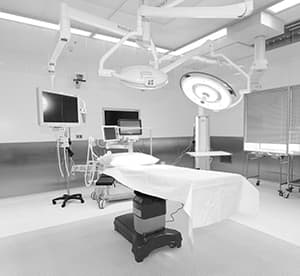Functional Endoscopic Sinus Surgery in Dubai
Functional Endoscopic Sinus Surgery in Dubai
The goal of Sinus Surgery is to restore normal sinus ventilation and their “drainage” function after becoming physically obstructed either by scar tissue following recurrent infection or by nasal polyps. Medical treatment alone (antibiotics and nasal sprays) cannot solve the problem. This is a minimally invasive procedure; therefore, after the procedure, on the same day, you can go home.
There are four groups of sinuses:
- Frontal sinuses (in the forehead)
- Ethmoid sinuses (between the eyes)
- Maxillary sinuses (cheekbone area)
- Sphenoid sinuses (behind the eyes)
Sinuses are hollow cavities in the facial skeleton and communicate via narrow passages called Ostia.

They naturally produce mucus, which is transported into the nasal cavity. In certain conditions (e.g. infection, nasal polyps or structural abnormalities), the entrance to a sinus may become blocked, and then mucus builds up within the affected sinus.
If it remains there for a long time period, it becomes infected, resulting in “ sinusitis”. If this does not resolve properly, it will destroy the normal function of your nose, creating a condition known as “chronic sinusitis”.
After the failure of conservative treatment, endoscopic surgery can be performed to reopen the door of the affected sinuses. The operation takes about 1 to 2 hours, usually under light sedation. No incision is made on your face and there are no black eyes after the surgery.
What can you expect after the surgery?
Functional Endoscopic Sinus Surgery in Dubai, also called Endoscopic sinus surgery in Dubai, is highly successful at improving the symptoms of sinus ventilation and removal of the nasal polyps. However, to avoid reoccurrence, strict protocol will be provided on how to irrigate your nose and which medication should be taken.
Even after successful surgery, a patient will be prone to bouts of sinus trouble more than the average person, but the frequency is usually less than before surgery. Such recurrences can be brought under control medically (rather than surgically) using various antibiotics, sprays/drops, decongestants or anti-inflammatory steroid
Before your surgery
Before your Functional Endoscopic Sinus Surgery in Dubai, advise that you stop smoking as soon as possible and avoid extensive sun exposure. Also, there are certain foods to be avoided, as they affect the development of blood clotting, like Aspirin, Vitamin E, dietary supplements, Otrivine, NSAID, garlic, and ginseng, at least 2 weeks prior to the surgery.

In the Hospital - the first six hours
- You may wake up with some packing in your nose to stop any bleeding. This should be left alone and will be removed by your doctor when appropriate.
- Do not blow your nose for 7 days
- If you experience any pain, it can easily be managed by a regular painkiller.
The first week at home
- You may get a blood stain / pinkish discharge for a few days. The bleeding gets less and less as the days go by, but there may still be a little “spotting” on your handkerchief even up to a few weeks after the surgery. This is common.
- If slightly more bleeding occurs after the surgery, please use a nasal decongestant spray to stop bleeding
- Avoid all moderate and heavy physical activity, including sports, for ten days after the operation. Avoid bending down to pick things up, especially heavy weights. Active sport should not be commenced for two weeks after the surgery, and even then, it should be increased gradually
- It is normal for the nose to feel blocked for several days and up to two weeks after the surgery as the swelling settles.
- You must irrigate your nose frequently, “douching” at least 3 times a day with the saline solution provided to clear away scabs and crusting which occur after the operation.
- Avoid smoky and dusty atmospheres if possible, as this may irritate the nasal lining.
- Avoid very hot baths and showers.
- If you take aspirin, please discuss this with Dr Levente, as you may need to avoid taking it since it could potentially increase the risk of nasal bleeding.
- It is advised not to drive for 48 hours because of the effects of the general anaesthetic.
Choose Dr Levente for expert FESS surgery – experience relief and renewed comfort with personalised care.
FAQs
Types of sinus surgery include functional endoscopic sinus surgery (FESS), balloon sinuplasty, and traditional sinus surgery.
Endoscopic sinus surgery involves the use of a thin, flexible tube with a camera (endoscope) to visualise and treat sinus issues. The surgeon accesses the sinuses through the nostrils, removing blockages, inflamed tissue, or polyps, and may widen the sinus openings to improve drainage.
The cost of endoscopic sinus surgery varies depending on factors such as the specific procedure needed, surgeon fees, anaesthesia fees, and facility charges. It’s best to consult with a healthcare provider for accurate pricing.
Functional endoscopic sinus surgery is generally considered safe when performed by a skilled surgeon. However, like any surgical procedure, there are risks involved, including infection, bleeding, and damage to surrounding structures. Your healthcare provider can discuss potential risks and benefits with you.
The success rate of functional endoscopic sinus surgery is typically high, with many patients experiencing significant improvement in symptoms such as nasal congestion, facial pain, and sinus infections. Success rates may vary depending on individual factors and the underlying cause of sinus issues





